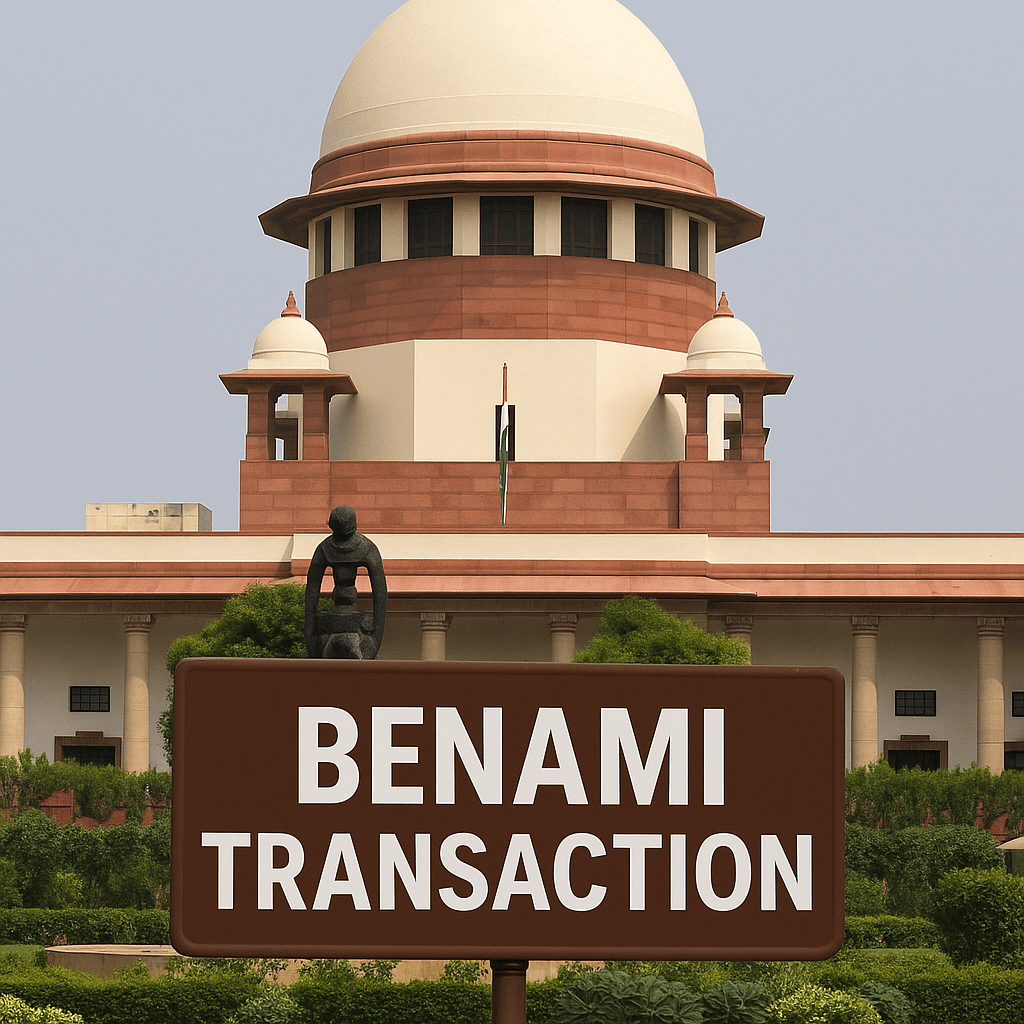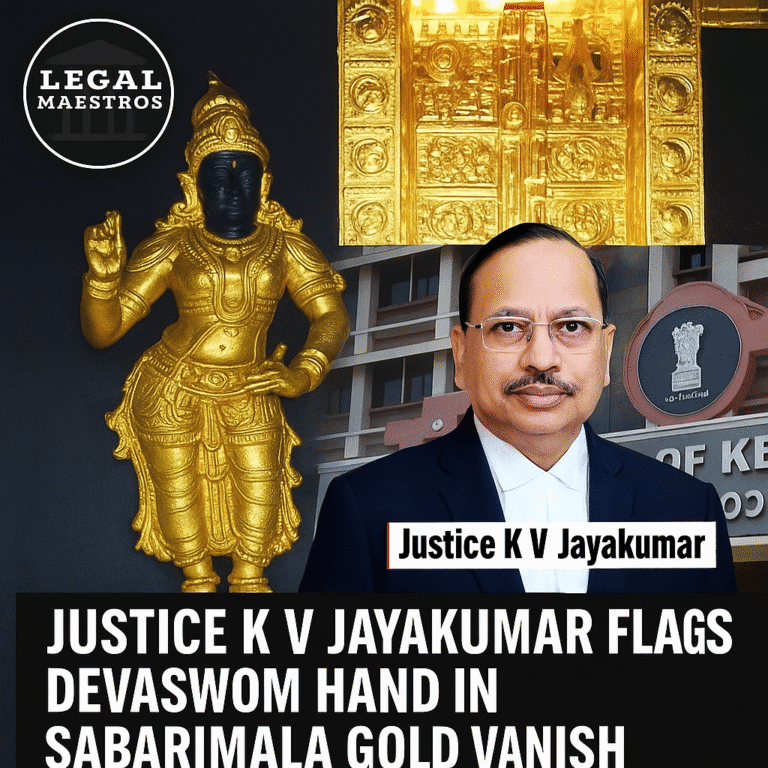
Introduction
The Supreme Court of India, in its judgment dated May 20, 2025, in the matter of *Shaifali Gupta v. Vidya Devi Gupta & Ors.* and *Deepak Lalchandani v. Vidya Devi Gupta & Ors.*, dealt with important issues surrounding joint Hindu family property, the scope of the Benami Transactions (Prohibition) Act, 1988, and the conditions under which a civil plaint can be rejected at the threshold under Order VII Rule 11 of the Civil Procedure Code (CPC). In addition to establishing boundaries for the manner in which and the circumstances under which the Benami Act can be applied, this ruling represents a significant reaffirmation of the law surrounding family conflicts involving ancestral property.
History of the Case and Facts of the Situation
This case centers on a disagreement that occurred within the family of Shanti Prakash Gupta, a deceased individual who had been the proprietor of a tailoring firm up to the time of his passing in 1977. It is not possible to find any immovable or moveable property that he left behind. With the money that they made from selling their mother’s jewelry, the two boys started a tailoring business in 1982 under the name “Himalaya Tailors.” This was after their father had passed away. In spite of the fact that both sons were in charge of the company, the younger son, Sudeep Gupta, was appointed as the official proprietor.
Over the course of time, the family was able to acquire a number of immovable properties, which were allegedly funded by the profits generated by this firm as well as another business known as Hemi Textiles, which was previously established by the eldest son. There were other members of the family that were responsible for the purchase of this property. The plaintiffs in this case were Vidya Devi Gupta, who was the mother, and Sudeep Gupta, who was the younger son. They claimed that all of these assets were purchased with the revenue from the joint family, and that they were therefore possessions that belonged to the joint family.
For any queries or to publish an article or post or advertisement on our platform, do call at +91 6377460764 or email us at contact@legalmaestros.com.
Civil litigation was initiated by them for the purposes of partition, possession, declaration, and injunction. Shaifali Gupta, the wife of the oldest son, had sold a number of properties to third parties, including Deepak Lalchandani and Surya Prakash Mishra, who were included as defendants in the lawsuit.
In accordance with Order VII Rule 11 of the CPC, a legal challenge
In accordance with Order VII Rule 11 of the CPC, Deepak Lalchandani and Surya Prakash Mishra submitted a request to have the plaint dismissed without further consideration. They maintained that the entire lawsuit was invalid because it violated Section 4 of the Benami Transactions (Prohibition) Act, 1988 (as modified in 2016), which states that they are not allowed to make any claims on properties that are held in the name of another person unless those properties fall under certain exceptions. Due to the fact that the properties were registered in the names of Shaifali Gupta and other individuals, rather than the plaintiffs, they asserted that the claim was benami and so precluded by law.
On the other hand, neither Shaifali Gupta nor the other members of the family, who were the primary parties to the dispute, had fought the suit on these grounds throughout the trial stage.
For any queries or to publish an article or post or advertisement on our platform, do call at +91 6377460764 or email us at contact@legalmaestros.com.
Both the High Court and the Trial Court have made their decisions.
The application was denied by the trial court in accordance with Order VII Rule 11, which stated that the question of whether the properties in question were joint family properties or benami transactions could not be decided only based on the appearance of the plaint. Evidence and making a conclusion based on facts were required. This result was maintained by the High Court in its revision, with the emphasis being placed on the fact that the Benami Act did not apply in matters of this nature that were in the preliminary stage without a trial.
Arguments that have been presented to the Supreme Court
Both Shaifali Gupta and Deepak Lalchandani submitted petitions for special leave to the Supreme Court. One of the petitions was initially submitted by Shaifali Gupta. They maintained that the lawsuit should have been dismissed completely because it violated Sections 4 and 14 of the Benami Act, which prohibit lawsuits from being filed.
In contrast, the plaintiffs asserted that these regulations did not apply to the homes since they were jointly owned by a Hindu family and were purchased with money that was shared by both members of the family. In addition, they argued that Section 4 of the Benami Act only forbids claims in which a third party purchases a property in the name of another individual, unless the transaction falls under one of the designated exceptions. The complaint states that the properties were never declared as benami, but rather as part of the joint family property that should be considered.
For any queries or to publish an article or post or advertisement on our platform, do call at +91 6377460764 or email us at contact@legalmaestros.com.
Analysis and findings from the Supreme Court of the United States
The aim of Section 4 of the Benami Act, as well as its applicability, were both extensively addressed by the Supreme Court. This clause makes it illegal for anybody to file a lawsuit in order to assert ownership of property that is held benami, which means that the property is registered in the name of another individual, but the payment was made by a third party. Nevertheless, the Court emphasized that not all of these kinds of transactions are considered illegal or benami in accordance with the law.
Section 2(9) of the Act states that some transactions, particularly those involving family members or properties held in a fiduciary capacity, are exempt from being classified as benami. This exception applies to transactions that involve family members. As a result, the Court came to the conclusion that the mere fact that a piece of property is registered in the name of a single member of the family does not necessarily constitute a benami transaction. It must be proven with facts and evidence if it is claimed that it was purchased from the income of the joint family, and it must not be rejected at the beginning of the process.
The Supreme Court reaffirmed the norm that it had previously established in its earlier decision in the case of Pawan Kumar v. Babu Lal (2019), which stated that a complaint can only be dismissed under Order VII Rule 11(d) if it is demonstrably and unequivocally prohibited by law based on the complaint itself. If there is any disagreement on the facts, the case ought to be brought before a judge.
For any queries or to publish an article or post or advertisement on our platform, do call at +91 6377460764 or email us at contact@legalmaestros.com.
The court also decided that Section 14 of the Hindu Succession Act, which states that a Hindu woman is the complete owner of the property that she holds, does not prevent an individual from disputing whether or not such possession was lawful or whether or not the property was genuinely joint family property. In light of this, the clause in question does not render the suit incapable of being maintained.
The Court made a significant observation, which was that the primary opposing family members, which consisted of the older son and his wife, had never brought up the subject of the Benami Act in the lower courts. Because of this, it became clear that subsequent purchasers who were not personally acquainted with the history of the property were unable to raise complaints of this nature without providing evidence.
The conclusion and the significance of the decision are as follows:
The verdicts of the trial court and the High Court were supported by the Supreme Court, meaning that both Special Leave Petitions were rejected by the Supreme Court. The significance of this ruling lies in the fact that it makes it very clear that family disputes concerning joint property cannot be resolved at the very beginning by incorrectly citing the Benami Act. This substantiates the notion that partition actions based on Hindu family law must be investigated via the use of evidence and must not be dismissed without due consideration.
For any queries or to publish an article or post or advertisement on our platform, do call at +91 6377460764 or email us at contact@legalmaestros.com.
Because of the ruling, subsequent purchasers are restricted in their capacity to dispute the character of the property, particularly in situations where they do not have firsthand knowledge about the manner in which the property was obtained. It safeguards the rights of family members to assert their entitlement to their portion of the family’s property, even in situations when the formal title is held by a different family member.
By reinforcing the principle that courts must allow parties to present their case fully where facts are in dispute, the Supreme Court has preserved the balance between preventing fraudulent claims and ensuring justice in genuine family property disputes. This decision will guide trial courts in dealing with partition suits and prevent misuse of procedural rules like Order VII Rule 11 to stifle litigation prematurely.




![Research Assistantship @ Sahibnoor Singh Sindhu, [Remote; Stipend of Rs. 7.5k; Dec 2025 & Jan 2026]: Apply by Nov 14, 2025!](https://legalmaestros.com/wp-content/uploads/2025/11/Gemini_Generated_Image_s0k4u6s0k4u6s0k4-768x707.png)
![Karanjawala & Co Hiring Freshers for Legal Counsel [Immediate Joining; Full Time Position in Delhi]: Apply Now!](https://legalmaestros.com/wp-content/uploads/2025/11/Gemini_Generated_Image_52f8mg52f8mg52f8-768x711.png)
![Part-Time Legal Associate / Legal Intern @ Juris at Work [Remote]: Apply Now!](https://legalmaestros.com/wp-content/uploads/2025/11/ChatGPT-Image-Nov-12-2025-08_08_41-PM-768x768.png)
![JOB POST: Legal Content Manager at Lawctopus [3-7 Years PQE; Salary Upto Rs. 70k; Remote]: Rolling Applications!](https://legalmaestros.com/wp-content/uploads/2025/11/ChatGPT-Image-Nov-12-2025-08_01_56-PM-768x768.png)